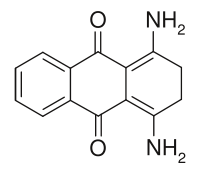1,4-Diamino-2,3-dihydroanthraquinone
 | |
| Names | |
|---|---|
| IUPAC name
1,4-Diaminoanthracene-9,10-dione | |
| Other names
Solvent violet 47 | |
| Identifiers | |
| 81-63-0 | |
| 3D model (Jmol) | Interactive image |
| ChemSpider | 4511053 |
| ECHA InfoCard | 100.001.244 |
| PubChem | 5354979 |
| |
| |
| Properties | |
| C14H12N2O2 | |
| Molar mass | 240.26 g·mol−1 |
| Appearance | Dark greenish to brownish powder |
| Density | 1.4 g/cm3 |
| Melting point | 248 to 252 °C (478 to 486 °F; 521 to 525 K) |
| Boiling point | 375.1 °C (707.2 °F; 648.2 K) |
| Soluble in hot nitrobenzene | |
| Hazards | |
| Main hazards | Mutagenic; emits NOx vapors when heated to decomposition. |
| Flash point | 180.7 °C (357.3 °F; 453.8 K) |
| Except where otherwise noted, data are given for materials in their standard state (at 25 °C [77 °F], 100 kPa). | |
| | |
| Infobox references | |
1,4-Diamino-2,3-dihydroanthraquinone is an anthraquinone dye used with Disperse Red 9 in colored smoke to introduce a violet color. It is also used in dyes and marine flares.
Synthesis
1,4-Diaminoanthraquinone is reacted with sodium dithionite to produce 1,4-diamino-2,3-dihydroanthraquinone.[1]
References
- ↑ Heyer, Thomas; Hans-Joachim Niclas, Stephan Dietzel (2010)
This article is issued from Wikipedia - version of the 3/4/2015. The text is available under the Creative Commons Attribution/Share Alike but additional terms may apply for the media files.